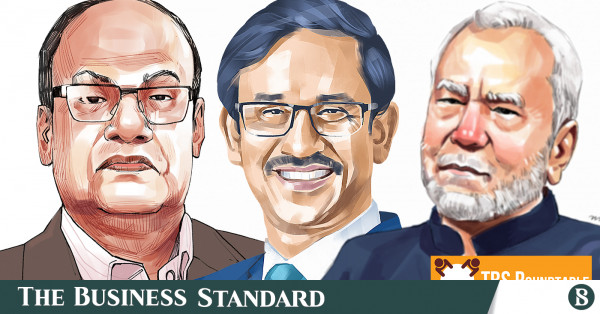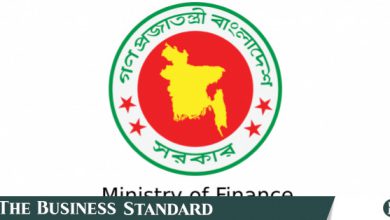How flawed regulations, interventions cripple Bangladesh’s capital market


Bangladesh’s capital market has been strangled by flawed regulations and the influence of vested interests, experts and stakeholders said at a roundtable hosted by The Business Standard yesterday.
One of the key concerns raised at the event was the requirement for mutual funds to invest three-quarters of their assets in stocks, despite a significant shortage of investible, high-quality securities.
Another troubling example was the tenure extension of closed-end mutual funds, violating their trust deeds that undermined investor confidence in professional fund managers.
Market experts also pointed to the stock market regulator, the Bangladesh Securities and Exchange Commission (BSEC), for its role in destabilising the market.
They said how the BSEC’s pressure on investors not to sell shares, even when portfolios were plunging, led to margin calls, and again the regulator’s verbal orders for no forced selling in leveraged accounts ultimately left both the investors and the lenders with substantial losses.
Another controversial decision to impose a floor price during the Covid-19 pandemic in 2020, and again in 2022 for over a year and a half, has further dented market confidence. Foreign investors, in particular, have been left frustrated as their funds remain locked in a stagnant market.
“It is like you invited a guest and then locked him in your house,” said Shanta Asset Management Vice Chairman Arif Khan, who is also a former commissioner of the BSEC.
But the problems run deeper.
“Exclusion of Greenfield companies from raising funds in the capital market is a missed opportunity.”
Faruk Ahmed Siddiqi, former chairman, BSEC
Analysts accused a vested group, allegedly in league with the regulator, of manipulating the market through a “pre-IPO private placement business” and inflating the stocks’ prices later in the secondary market for exits with big profits and leaving general investors in pain.
They argued that frequent intervention and index manipulation by the BSEC itself have suffocated the market, leaving it in a dire state.
“‘Don’t sell shares,'” recalled Md Moniruzzaman, managing director of Prime Bank Securities, describing how often they would receive calls from the regulator. BSEC officials threatened them, saying, “The chairman sir will be upset with you,” he added.
Faruq Ahmad Siddiqi, during his chairmanship at the securities regulator had received phone calls from four of the then ministers, including the finance minister, on a day of a mere 90 points drop in the Dhaka bourse’s major index.
“They treated the fall in stock index as politically sensitive, a discredit of the government and they did not want to let the market go down,” he said.
Nexus of corrupts
The wrong mindset prevailing among all stakeholders, later coupled with a nexus of some corrupt market players, intermediaries and the regulator kept only victimising the general investors, fair institutional investors, banks, said capital market expert Al-Amin, an associate professor of Accounting and Information Systems at the University of Dhaka.
“It all was a chain nexus to drain capital out, general investors were cheated repeatedly,” he said.
It started with huge pre-IPO placement share allocations to the cartel members, the regulator facilitating their listing despite poor business health and ultimately inflating secondary market prices to dump their shares at sky high prices, he added.
For instance, Al-Amin said, general investors were allowed to subscribe a maximum of Tk10,000 for primary shares. The BSEC extended it to Tk10-Tk15 lakh even for the IPO schemes under connivance like Techno Drugs earlier this year, or Best Holdings before that to add to demand for the shares.
Corrupt people like former NBR official Matiur Rahman had pre-IPO stakes in such schemes.
He also blamed the nexus for secondary market manipulations over years that ultimately hurt everyone but the wrongdoers.
Professor Abu Ahmed, the new chairman of Investment Corporation of Bangladesh told a shoe maker deserving a stock price of Tk25-Tk30 saw it shooting to around Tk150 and it was done through regulator hiring manipulators.
Destruction of mutual fund industry
Recalling the early 2011 situation, UCB Asset Management MD and CEO Shekh Mohammad Rashedul Hasan said, “I can clearly see the market going down the drain and the regulator is forcing us to keep 75% of our funds into the falling stocks. Asset managers got licence to manage funds but not the needed discretion.”
It has been an unwanted situation when compliance results in failure to protect investors’ capital and noncompliance helps, he added.
“Extending the tenure of closed-end mutual funds is a betrayal with investors.”
Prof Abu Ahmed, Chairman, Investment Corporation of Bangladesh
Awarding too many licences without justification in the intermediary industries — brokerage, merchant banking and asset management — the regulator in the past one and half decade mainly created a pool of “eligible institutional investors” to cash in on the IPO schemes.
In the late 2010s, the BSEC allowed the closed-end mutual funds to run for another 10 years. It let the asset managers taking advantage of the regulations keep earning fees for another decade. But the investors who relied on the trust deed of the funds and took positions at discounts eying liquidation at net asset value got stuck.
A foreign investor took to the court in 2019-20 and ended up with frustration as the court did not help it.
CFA Society Bangladesh President Asif Khan said, commitments in the market by anyone must be honoured.
Why good companies are reluctant
Professor Abu Ahmed said, in the 1980s and 1990s the stock market got many good companies that were rare in the past 10-15 years.
Asif Khan said professional investors hardly find over a dozen investable companies here.
Lengthy listing processes, improper IPO valuations, a lack of clarity on the benefits of corporate governance, the exclusion of Greenfield companies, and easy access to bank loans are often cited as reasons for the tepid interest in going public.
Faruk Ahmed Siddiqi noted that the exclusion of Greenfield companies from raising funds in the capital market is a missed opportunity. “If a company needs working capital or funds for expansion, banks are always available,” he said.
“Banks are ready with cash. Since raising funds from the capital market is a lengthy process, businesses have no choice but to turn to banks for working capital,” Siddiqi said, adding that also bank borrowing reduces tax liability while paying back equity investors through dividends are subject to high taxes.
The former BSEC chairman also suggested that it’s time to revisit the IPO pricing formula to attract more companies to the market.
Arif Khan echoed these concerns, stating that restrictive regulations and drawn-out procedures—taking between one and two years for approval—are discouraging new listings.
Big companies are reluctant to sell their shares at regulator-dictated tight prices here, he said, adding that in other markets shares are priced based on demand and supply only.
“The floor price – It is like you invited a guest and then locked him in your house.”
Arif Khan, Vice Chairman, Shanta Asset Management
When the private sector investment will surge from its long stuck level of 23% of the GDP, capital market will be more pertinent as the banks cannot ensure long term financing out of their short term deposits, said Faruk Ahmed Siddiqi.
Businesses are depending on banks for 98%-99% capital needs here, said Arif Khan, adding, this is why the stock market size is hovering within 7%-14% of the GDP, which is over 100% in many countries including India.
“We may have to discuss the same problem a decade later if things do not change fast,” he said, suggesting a committee comprising all the stakeholders
What is needed for the future?
“If I were the regulator, I would remove the restrictive measures and push for good governance and law abidance, ” said Abu Ahmed.
Arif Khan said, the mindset that any fall in stock prices and indices are the evil must go. Instead, letting the market decide the prices based on underlying fundamentals and supply-demand.
It sets a wrong key performance indicator for the regulator that causes too many problems in the market, said Asif Khan.
Upholding good governance, ensuring international standards and quality of financial statements and audits, incentivizing good companies, good market players alongside punishing bad ones are the common recommendations.
“Delayed investigations only hurt the general investors as the scammers take away funds already, related parties are exempted usually,” said Professor Al-Amin.
All the good changes should start from the regulator itself, said Asif Khan, adding that there are needs to distinguish the roles of separate stakeholders for the development of the market.
Arif Khan suggested BSEC should engage itself more in formulating rules and regulations and letting the bourses work more in monitoring surveillance.
The bourse can send its market surveillance report every month and the regulator should objectively enforce them in 90 days.
Faruq Ahmad Siddiqi said laws are there that might need changes. But implementation of law is the most important part.




